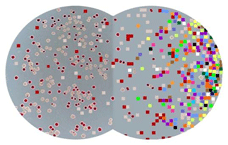Publication Search Results
- Morris, J. J., S. E. Papoulis, and R. E. Lenski. 2014. Coexistence of evolving bacteria stabilized by a shared Black Queen function. Evolution 68:2960-2971. (Abstract)[doi:10.5061/dryad.2753k]
- Morris, J. J., R. E. Lenski, and E. R. Zinser. 2012. The Black Queen Hypothesis: Evolution of dependencies through adaptive gene loss. mBio 3:e00036-12. (Abstract)[doi:10.5061/dryad.7j8c5s5j]
- Hillesland, K. L., G. J. Velicer, and R. E. Lenski. 2009. Experimental evolution of a microbial predator’s ability to find prey. Proceedings of the Royal Society, London B 276:459–467. (Abstract)
- Hillesland, K. L., R. E. Lenski, and G. J. Velicer. 2007. Ecological variables affecting predatory success in Myxococcus xanthus. Microbial Ecology 53:571-578. (Abstract)
- Velicer, G. J., R. E. Lenski, and L. Kroos. 2002. Rescue of social motility lost during evolution of Myxococcus xanthus in an asocial regime. Journal of Bacteriology 184:2719-2727. (Abstract)(Acrobat file)
- Lenski, R. E., and G. J. Velicer. 2000. Games microbes play. Selection 1:89-95. (Acrobat file)
- Velicer, G. J., L. Kroos, and R. E. Lenski. 2000. Developmental cheating in the social bacterium Myxococcus xanthus. Nature 404:598-601.
(Abstract)(Acrobat file)
- Velicer, G. J., L. Kroos, and R. E. Lenski. 1998. Loss of social behaviors by Myxococcus xanthus during evolution in an unstructured habitat. Proceedings of the National Academy of Sciences, USA 95:12376-12380. (Abstract)(Acrobat file)
Edit Mode
